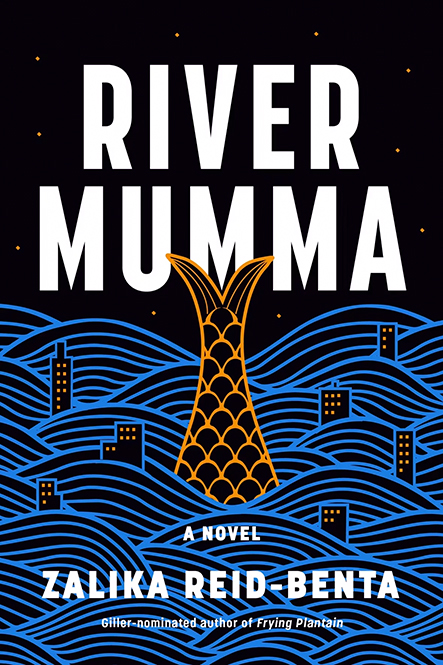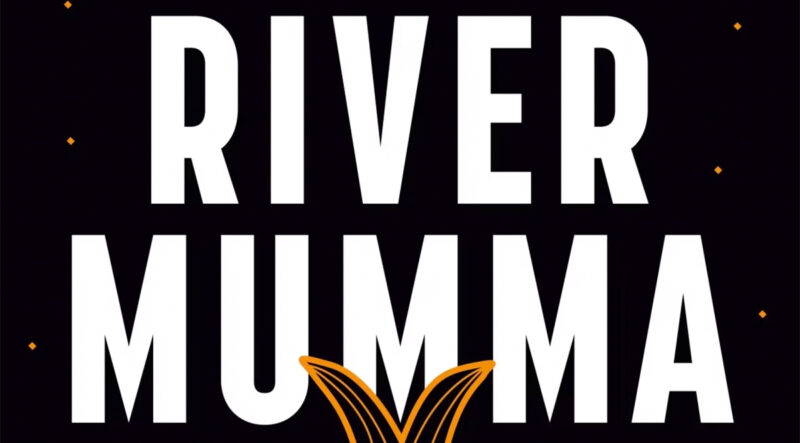The world is entering a time when countries once part of a long-in-the-tooth empire want to be rid of them.
And rightly so. Barbados shed its Commonwealth skin in favour of ruling as they see fit. Belize is another nation looking to rid the Crown as head of state, whether it be symbolic or not. Grenada, the Bahamas and Jamaica are also contemplating the move.

by Zalika Reid-Benta
Penguin Books
Toronto, 2023
4.5/5
That undercurrent flows throughout Zalika Reid-Benta’s novel River Mumma. It follows the Hobbit-esque journey that Alicia, a tortured academic slogging through a retail job, and her acquaintances Heaven and Mars endure.
The book takes its name from the Caribbean deity, and mermaid, River Mumma. Also known as Mama D’Leau in Trinidadian folklore and Mami Wata throughout the African diaspora; she is the guardian of all rivers and sits atop a rock combing her luxuriant hair with a golden comb. And she often drags the greedy to their Waterloos.
Now, Reid-Benta’s protagonist, Alicia, is tasked with finding River Mumma’s golden comb, which was stolen by a tourist who lives in Toronto. Alicia’s family, the deceased matriarch Grandma Mabel in particular, have spiritual ties to River Mumma, and such supernatural topics as telepathy, mediumship and reincarnation tie in with the rich folklore Jamaica has to offer.
Although it’s found on the shelves of the literature section at Indigo, it wouldn’t be out of place on the horror shelf. And that is thanks to the duppies that lurk on the borders of light and dark.
The Rolling Calf, the Whooping Boy and the Three-Foot Horse all make an appearance as antagonists preventing Alicia and her friends from retrieving the golden comb, with the Ol’ Higue mentioned briefly during one of Alicia’s visions.
All these spirits are from Jamaican lore, and the Rolling Calf is the most fearsome, with glowing red eyes and fire shooting from its nostrils. It is believed that those who were bad in life return to the supernatural realm as the Rolling Calf. It appears as a giant bull, or it can also appear as a demonic cat. Reid-Benta doesn’t disappoint as both guises make an appearance through the pages of River Mumma.
It is deterred by the heroes by throwing random stuff for it to count. The goal, as in the book, is to reach a number higher than nine, since duppies cannot count beyond that.
As for the Whooping Boy, it rides the Three-Foot Horse, which has the same eyes of burning red, and fiery hot breath. The Whooping Boy is said to be the tortured soul of a slave. Unlike the previous two duppies, the Three-Foot Horse is not afraid of moonlight and will move at a steady clip.
The Ol’ Higue, or Hag, is the duppy of a witch who enjoys the taste of young flesh. She will shed her skin and take the form of an owl, or in Reid-Benta’s book, a ball of fire. To remove the hag, you must find the calabash containing her skin and sprinkle it with salt and pepper. It prevents her from putting her skin back on.
However, if you don’t have these common kitchen items, which our trio of heroes often struggle to find, some rice will do the trick, as she too will be forced to count every grain, delaying her pursuit and allowing you, the victim, to escape.
Reid-Benta deftly blends this world into the Toronto landscape and even throws in some Shining-esque references to Canadian ghosts. The spirit of the mason Ivan Reznikoff, who is alleged to haunt the University of Toronto campus, appears, as do some shades at the Fairmont Royal York. Some liberties are taken with the latter as there is no reference to the eighth-floor ghost in her book; only disgruntled guests with glowing red eyes, and demonic children who drag Alicia to her potential death.
I did feel the story jumped the shark just a bit with the appearance of an implied Drake-like celebrity. Still, given how incestuous the Toronto celebrity scene is, it was either him or a facsimile of Margaret Atwood that would’ve been bequeathed the golden comb by a well-to-do restaurateur, and Drake is more fitting to the story.
River Mumma is an excellent example of folklore wrapping itself into the modern world. It’s a Jamaican-Canadian version of Neil Gaiman or Helene Wecker; borrowing from a universe of creatures and deities lost through Christianity or erased by colonialism.
River Mumma is that literary golden comb resurrected from a sea of colonialism.

